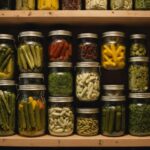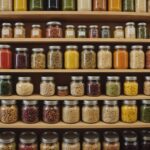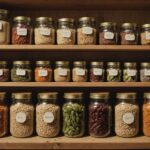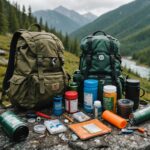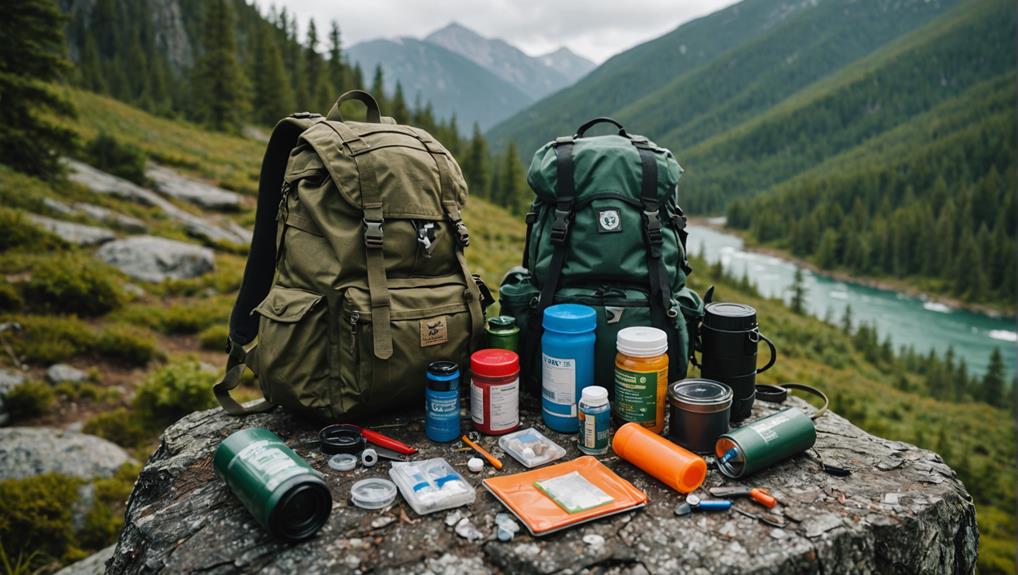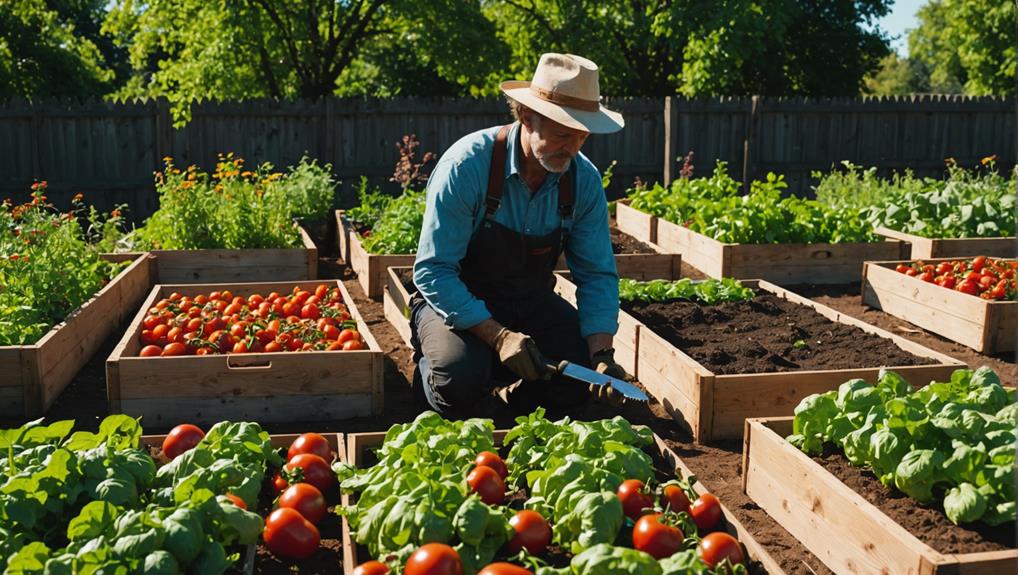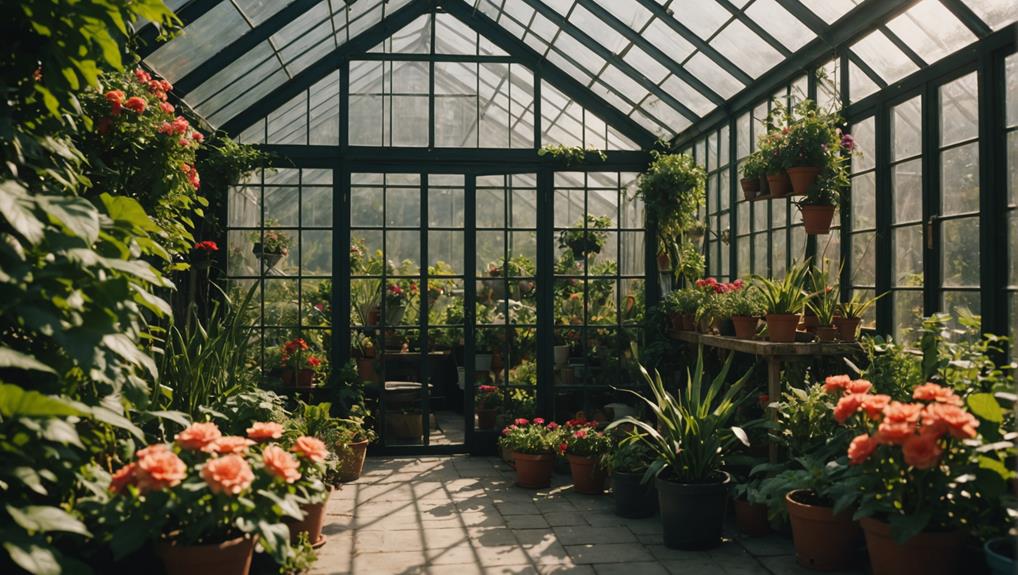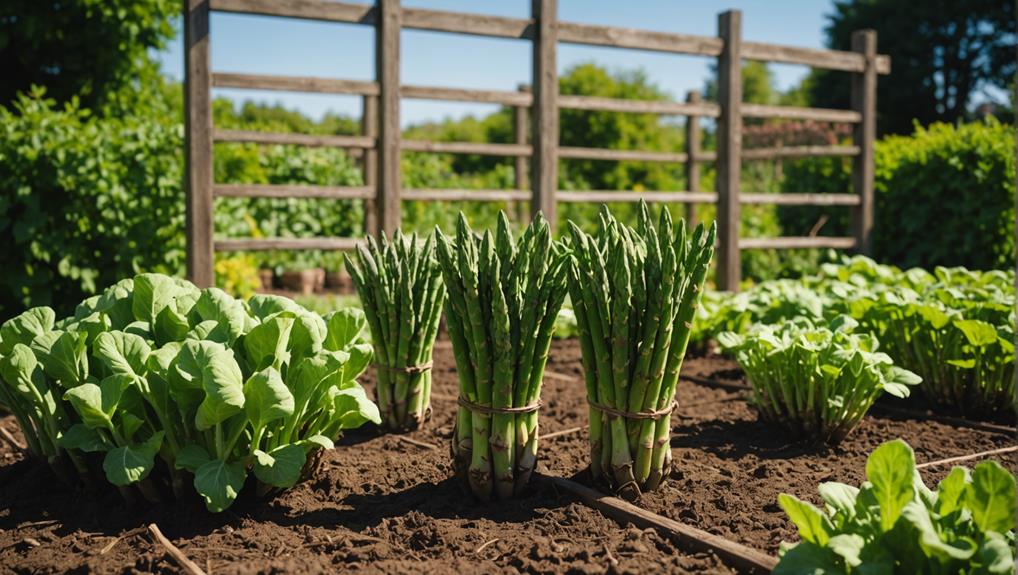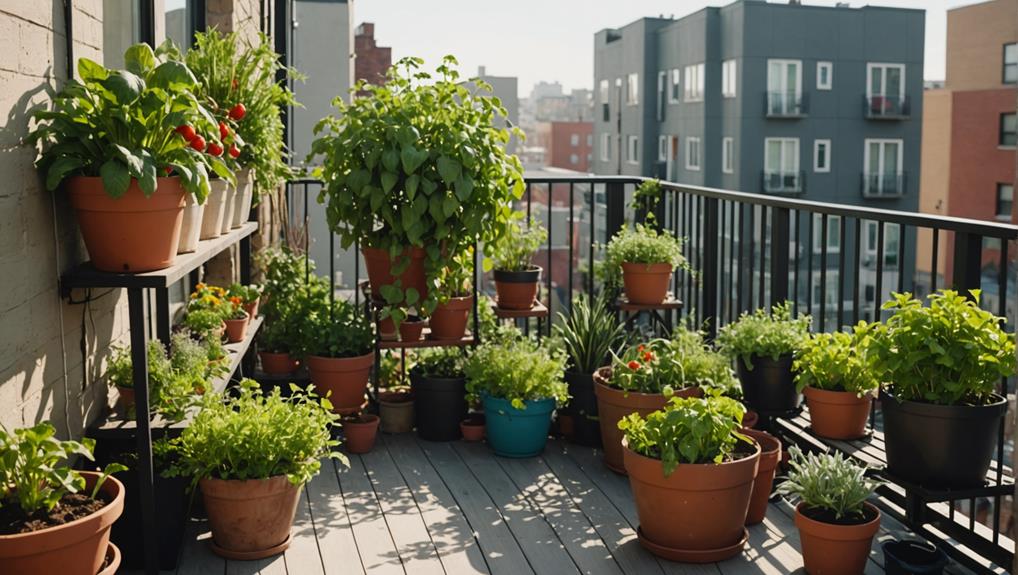As an Amazon Associate I earn from qualifying purchases.
As a prepper, you should have ten essential items to guarantee your survival during emergencies. First, stockpile non-perishable foods and at least one gallon of water per person per day. Next, equip yourself with a well-stocked first aid kit and versatile cooking equipment like portable stoves. Don't forget survival tools, such as multi-tools and reliable knives. Include communication devices, like emergency radios and charging solutions, alongside emergency sanitation supplies. Finally, consider protection items like self-defense training and firearms. Want to discover even more vital prepping essentials? Stay tuned for additional insights!
Essential Protection Items
When preparing for emergencies, having essential protection items like firearms, ammunition, and bear spray can greatly enhance your safety and peace of mind. Firearms and ammunition are not just tools for self-defense; they're crucial for your long-term security in uncertain times. Consider investing in biometric gun safes, which guarantee that your firearms are both secure and easily accessible when you need them most. This combination of safety and readiness is essential.
Creating a solid protection plan is important. You should incorporate self-defense training into your routine, empowering yourself with the skills needed to handle dangerous situations confidently. Regular practice keeps you sharp and ready to act when it matters.
Also, remember that ammunition can serve as a valuable trade item during prolonged crises, giving you leverage in tough times. Regularly review and update your protection items based on emerging risks and your personal circumstances to guarantee you're always prepared. By prioritizing these essential items, you take a significant step toward safeguarding your freedom and security. Stay vigilant, stay prepared, and embrace the peace of mind that comes with being ready for anything.
Water Storage Solutions
Having a solid protection plan doesn't just stop at personal safety; you also need to secure an adequate water supply for emergencies. Storing at least one gallon of water per person per day is crucial, with a minimum two-week supply as your goal. Consider using durable water containers like barrels for bulk storage. These can hold large quantities, but you should regularly check for leaks or contamination.
For on-the-go needs, portable water jugs are incredibly handy. They make it easy to refill and transport your water supply wherever you may roam. Don't forget the importance of purification systems. Filters or purification tablets guarantee any unsafe water sources can be made safe for drinking.
You might also consider implementing a rainwater collection system. It's an eco-friendly method that can provide additional resources during emergencies.
Here's a quick reference table to help you decide on your water storage solutions:
| Type of Water Storage | Capacity | Key Features |
|---|---|---|
| Water Barrels | 50-55 gallons | Durable, bulk storage |
| Portable Water Jugs | 1-5 gallons | Easy transport |
| Purification Systems | Varies | Guarantee safe drinking |
| Rainwater Collection System | Customizable | Sustainable & eco-friendly |
Non-Perishable Food Supplies
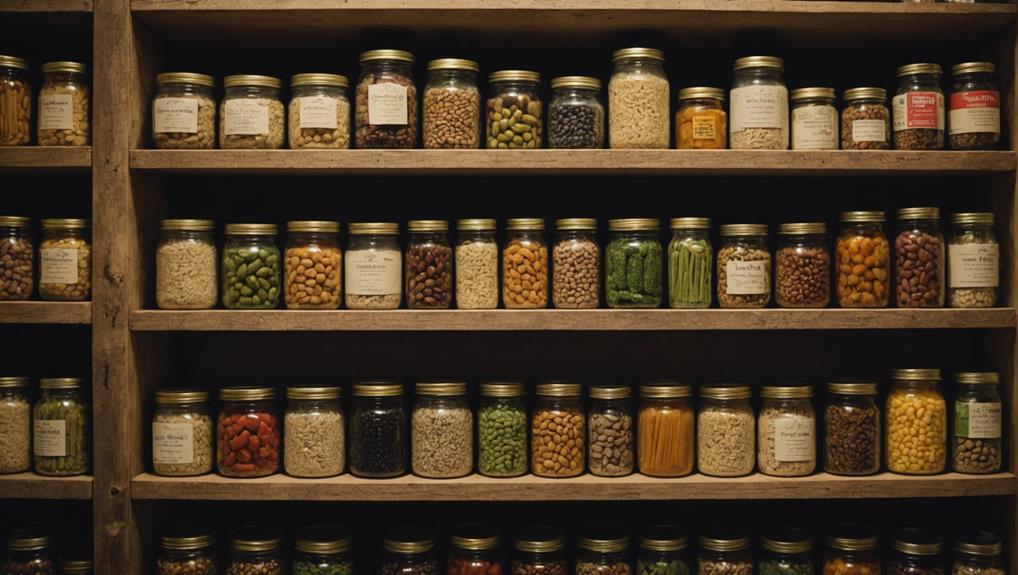
Stockpiling non-perishable food supplies is essential for ensuring your family has enough nutrition during emergencies. Aim for at least two weeks' worth of items like canned goods, dried legumes, and grains, providing a balanced diet when it matters most. Focus on foods with a long shelf life, such as rice, pasta, and freeze-dried meals, which offer essential nutrients and energy while remaining safe to consume over time.
Effective food storage is important. Regularly check expiration dates and use the first in, first out (FIFO) method to maintain freshness and minimize waste. Don't forget to incorporate a variety of non-perishable snacks like nuts, granola bars, and dehydrated fruits. These can boost morale and sustain energy levels in an emergency situation.
It's also wise to take into account any dietary restrictions or preferences within your family. By being proactive about your non-perishable food supplies, you empower yourself and your loved ones to thrive, even in the toughest times. Your freedom and well-being depend on being prepared, and a solid food supply is a cornerstone of that preparation.
Tradeable Goods for Bartering
Tradeable goods like lighters, batteries, and hygiene products can become invaluable assets during emergencies, allowing you to exchange for essential supplies. When the situation gets tough, having items that others need can make all the difference.
Here are three key tradeable goods you should consider stockpiling:
- Non-Perishable Food Items: Canned goods and snacks are always in demand. They not only sustain you but can also be bartered for other necessities.
- Personal Care Items: Think about including feminine hygiene products and toiletries. Maintaining health and hygiene is vital, making these items particularly valuable when resources are scarce.
- First Aid Supplies: While you'll want to save some for your own needs, extra bandages, antiseptics, and basic medical tools can be worth their weight in gold during a crisis.
First Aid and Medical Supplies
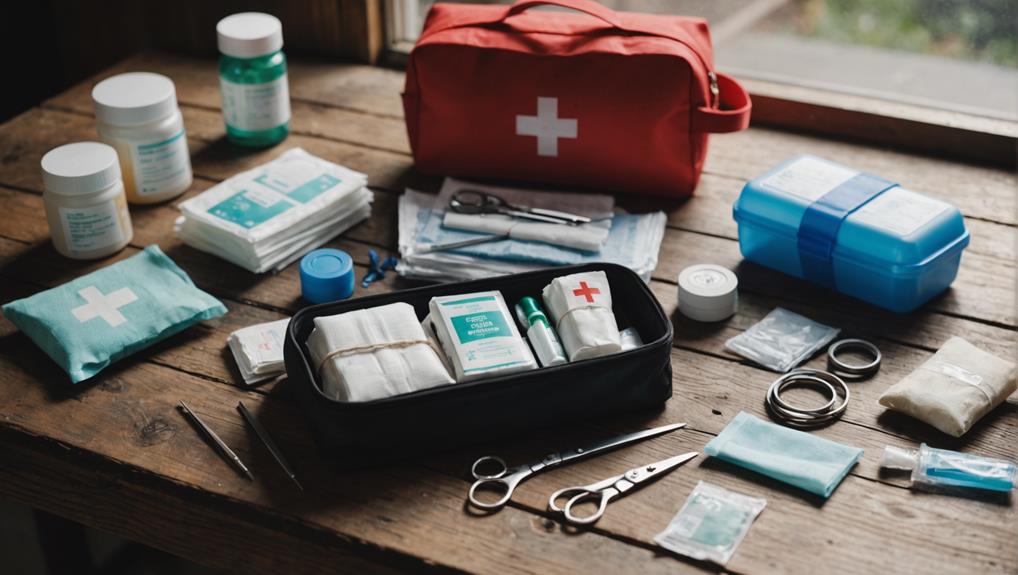
When preparing for emergencies, you can't overlook the importance of first aid and medical supplies. A well-stocked kit, along with necessary medications and proper training, will guarantee you're ready to tackle any health-related challenges that may arise. Let's explore the essential items you should have and the skills that can make a real difference in a crisis.
Essential First Aid Items
A well-stocked first aid kit is essential for addressing injuries and health issues during emergencies, so make sure it includes important items like bandages, antiseptics, and pain relievers. Having these supplies on hand gives you the ability to handle minor injuries and ailments effectively, which is a key part of your preparedness strategy.
Here are three necessary items to include in your First Aid Kit:
- Adhesive Bandages: Keep a variety of sizes to cover cuts and scrapes quickly.
- Antiseptic Wipes: These are crucial for cleaning wounds and preventing infection.
- Pain Relievers: Stock necessary medications like ibuprofen or acetaminophen to manage pain.
Don't forget to regularly check and update your kit, ensuring everything is within its usable dates. Having these important supplies not only helps you stay self-reliant but also empowers you to care for yourself and others in times of need. Remember, being prepared can make all the difference in maintaining your freedom during emergencies. Stay vigilant, and prioritize your health by keeping your first aid kit well-stocked and ready to go!
Stocking Medications and Supplies
Stocking medications and medical supplies is essential for guaranteeing you're prepared to handle any health issue that may arise during an emergency. Start by stockpiling essential medications, guaranteeing you have at least a 30-day supply of any prescriptions you or your family members may need. This precaution can help you manage chronic conditions or address acute health issues when access to medical facilities is uncertain.
A well-stocked first aid kit is a must-have. It should include bandages, antiseptics, gauze, and pain relievers to address common injuries. Regularly check your medical supplies to guarantee they're up-to-date and ready for use. Don't forget to include hygiene products, such as feminine hygiene supplies and baby formula, to maintain health and comfort during extended crises.
Training and Skills Development
Training in first aid and medical skills is essential for enhancing your ability to respond effectively during emergencies. It's not just about having a first aid kit; it's about knowing how to use it. Here are three key areas to focus on for your training and skills development:
- Basic First Aid Techniques: Learn essential skills like CPR and wound care. This knowledge can save lives and boost your confidence in handling medical situations.
- Wilderness First Responder Courses: If you enjoy the outdoors, consider taking a wilderness first responder course. These programs equip you with the skills needed to manage injuries in remote locations, where help may not be readily available.
- Regularly Update Your First Aid Kit: Confirm your first aid kit is stocked with essentials like bandages, antiseptics, and pain relievers. Regularly check for expired items so you're always prepared.
Shelter and Warmth Gear
When prepping, having the right shelter and warmth gear is essential for your survival. You need lightweight options for protection against the elements, plus effective techniques to preserve warmth during cold nights. Don't overlook the importance of proper clothing and portable heating solutions to keep you safe and comfortable in extreme conditions.
Essential Shelter Options
Selecting the right shelter options is vital for preppers to guarantee safety and warmth during emergencies. When you're caught in unpredictable situations, having reliable gear can make all the difference. Here are three must-have shelter options:
- Tents: Lightweight and portable, tents are your go-to solution for bug-out situations. They provide immediate shelter and protection from the elements, allowing you to focus on what really matters.
- Tarps: These versatile tools can create improvised shelters or shield your gear from rain and snow. Their adaptability makes them perfect for various scenarios, making sure you can set up a safe space wherever you are.
- Sleeping Bags: Warmth is imperative in any survival situation. Aim for at least two sleeping bags per family member to guarantee comfort during colder nights. Opt for bags suited for the climate you expect to encounter.
Warmth Preservation Techniques
To stay warm during emergencies, mastering warmth preservation techniques is vital, as they can make a significant difference in your survival experience. Prioritizing shelter is key, so portable options like tents and tarps should be part of your gear. Alongside that, investing in quality sleeping bags is important; aim for at least two per family member to guarantee everyone stays insulated.
Here's a quick reference table to help you gather your warmth essentials:
| Warmth Gear | Description | Importance |
|---|---|---|
| Sleeping Bags | Insulated bags for sleeping in the cold | Essential for nighttime warmth |
| Fire-Starting Tools | Waterproof matches, lighters, etc. | Critical for creating warmth and cooking |
| Extra Blankets | Additional layers for insulation | Increases comfort during emergencies |
| Portable Shelter | Tents, tarps for weather protection | Provides a safe space from elements |
Clothing for Extreme Conditions
Mastering clothing choices for extreme conditions is just as important as ensuring your shelter and warmth gear are in place. You need to stay warm, dry, and mobile to maintain your freedom and safety. Here are three essential items to take into account:
- Thermal Tops and Bottoms: These are vital for retaining body heat. Layer them under your outerwear to create an effective barrier against the cold.
- Durable Footwear: You can't navigate tough terrains without reliable footwear. Choose waterproof and insulated options that provide comfort and protection from the elements.
- Extra Blankets: Always have a few extra blankets on hand. Wool or synthetic fibers serve well for insulation and can add warmth to your sleeping area during emergencies.
Investing in high-quality clothing for extreme conditions can greatly enhance your chances of survival. Remember, layering is key. A proper base layer, insulating layer, and outer waterproof layer will help you adapt to fluctuating temperatures. Equip yourself wisely, and you'll be ready to face whatever nature throws your way.
Versatile Cooking Equipment
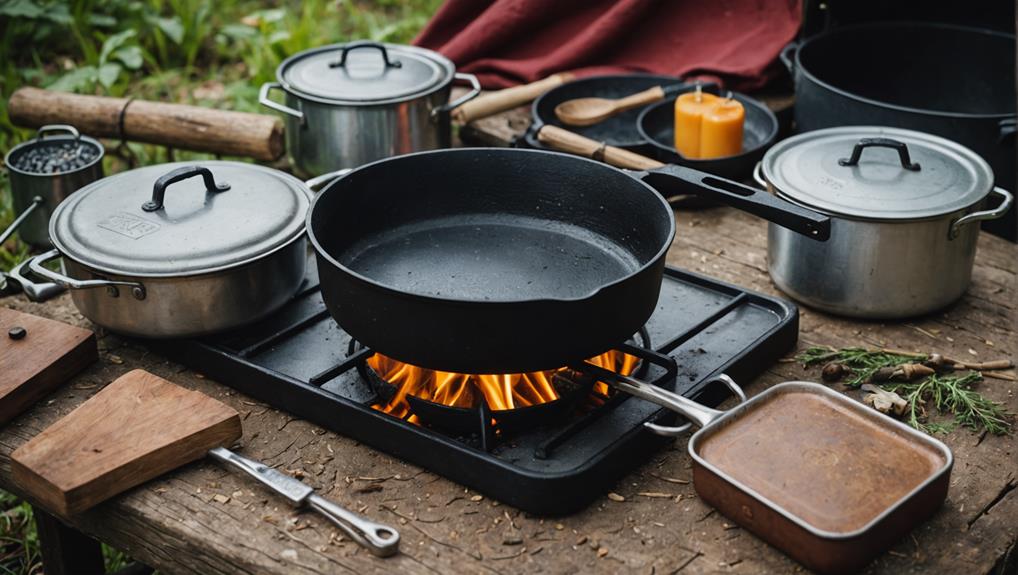
Versatile cooking equipment, like cast iron pans and portable propane stoves, guarantees you're ready to whip up meals in any emergency situation. When power's out or you're off the grid, a propane camping stove becomes your best friend. It's lightweight and doesn't rely on electricity, making it perfect for outdoor adventures or unexpected crises.
To enhance your cooking efficiency, invest in multi-functional kitchen tools. Items like manual can openers and whisks are essential for food prep when modern conveniences fail. You'll appreciate having these handy tools in your kit.
Don't overlook a solar oven, either. It harnesses the sun's energy to cook food and even sterilize water, offering a sustainable solution during long-term emergencies—especially in sunny climates.
Survival Tools and Gear
Survival tools and gear are essential for managing emergencies and ensuring your safety and well-being in unpredictable situations. Having the right equipment can mean the difference between thriving and merely surviving. Here are three must-have items you should consider:
- Multi-tools: A versatile multi-tool, like the Leatherman Wave Plus, is invaluable for various tasks. It simplifies food prep and minor repairs, keeping you equipped for whatever comes your way.
- Portable water filters: Access to clean water is vital. Lightweight filters, such as LifeStraws, allow you to drink safely from unreliable sources, giving you the freedom to venture into the wild without fear.
- First aid kit: Don't underestimate the importance of health in survival situations. A well-stocked first aid kit should include bandages, antiseptics, and pain relievers to handle injuries effectively.
In addition to these, a reliable knife or ax, like the Council Tool Hudson Bay Camp Axe, is essential for defense and practical tasks like cutting firewood or building shelter. Equip yourself with these essentials, and you'll be more prepared for any challenge that comes your way.
Communication Devices
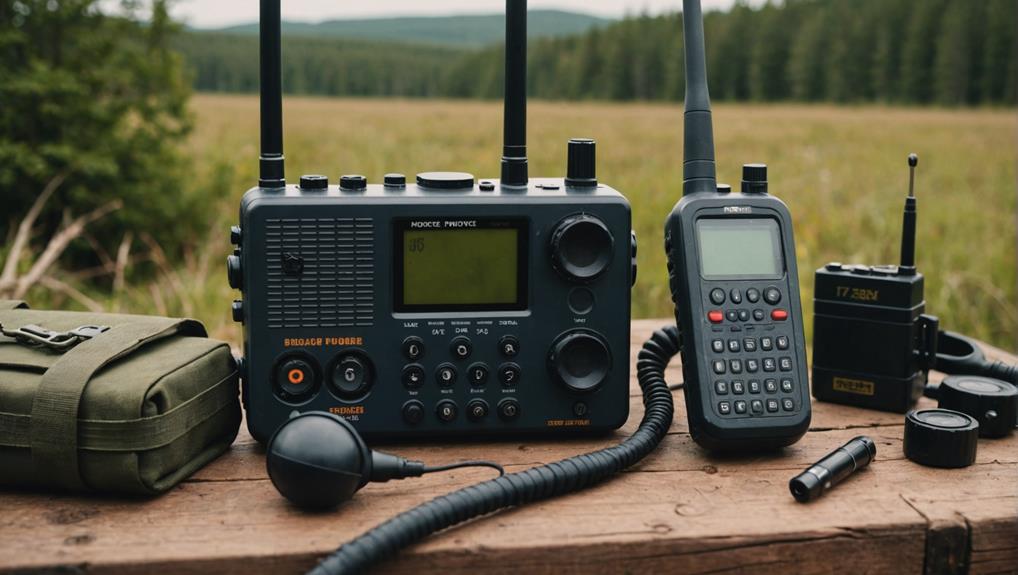
In an emergency, having reliable communication devices can make all the difference. You need essential emergency radios to stay updated on critical information and portable charging solutions to keep them powered. Let's explore how these tools can help you maintain contact and stay informed when it matters most.
Essential Emergency Radios
Essential emergency radios are vital tools that keep you informed and connected when traditional communication methods break down during a crisis. In a survival scenario, being aware of severe weather alerts or emergency updates can be lifesaving. These radios are designed to function even during power outages, guaranteeing you remain in touch with the world around you.
Here are three essential features to take into account when choosing your emergency radio:
- Multiple Power Sources: Look for radios that offer solar, battery, and hand-crank options. This versatility guarantees you have a reliable communication device regardless of the situation.
- NOAA Weather Band Access: Radios equipped with NOAA channels provide real-time updates on weather conditions. Staying informed can help you make critical decisions during emergencies.
- Portable Power: Some models come with built-in power banks, allowing you to charge your mobile devices. This feature is invaluable for maintaining communication with loved ones and emergency services.
Portable Charging Solutions
When preparing for emergencies, having portable charging solutions can keep your communication devices powered and ready for use. In unpredictable situations, a reliable solar charger can be a game-changer. These chargers harness the sun's energy to keep your devices alive during long-term power outages, ensuring you stay connected without depending on the grid. Many solar chargers offer multiple USB outputs, so you can charge several devices at once—essential in emergency scenarios.
Don't forget about battery-operated radios. They're crucial for receiving updates on weather and emergency alerts, and many models double as power banks to charge your phone. This dual functionality is important when you need information to make informed decisions.
Opt for compact and lightweight designs that are easy to carry, allowing you to stay mobile while remaining connected. Plus, some portable charging solutions are weather-resistant, ensuring they work reliably in various outdoor conditions. Investing in these tools not only enhances your preparedness but also supports your desire for freedom in controlling your own communication during any crisis. Stay empowered and ready to face whatever comes your way!
Emergency Sanitation Supplies
Emergency sanitation supplies play an essential role in maintaining hygiene and preventing illness during any crisis. Having the right tools at your disposal guarantees you can manage waste and uphold personal hygiene, which is critical for your well-being. Here are three must-have items for your emergency sanitation kit:
- Portable Toilets: You can easily create one using a 5-gallon bucket. This simple solution allows for effective waste disposal when traditional facilities aren't available.
- Garbage Bags: Stock up on heavy-duty garbage bags. They're important for proper waste disposal, helping you maintain cleanliness and preventing contamination in your living space.
- Basic Hygiene Products: Don't forget essentials like soap, toothbrushes, wipes, and feminine hygiene items. These personal hygiene supplies will help you stay clean and healthy during tough times.
Frequently Asked Questions
What Does Every Prepper Need?
Every prepper needs effective survival gear, solid emergency plans, reliable food storage, and self-defense strategies. These essentials empower you to navigate crises confidently, ensuring your freedom and safety in unpredictable situations. Stay prepared, stay free!
What Prepper Supplies Should I Stock up On?
When stocking up, focus on survival gear like emergency food and water purification methods. Don't forget a robust first aid kit. Being prepared empowers you to thrive during any crisis, ensuring your freedom and safety.
What Is the Number One Prepper Item?
When it comes to prepping, your number one item's clean, potable water. Without it, survival gear, emergency food, self-defense tools, and first aid supplies won't matter. Stay hydrated, and you'll maintain your freedom to thrive.
What Should You Stockpile?
You should stockpile food storage, enough water purification supplies, and emergency lighting. Don't forget a well-equipped first aid kit. These essentials empower you to stay prepared and self-reliant during unexpected situations, ensuring your freedom.
Conclusion
In summary, being prepared means having the right essentials on hand. By gathering protection items, water, food supplies, and medical gear, you'll be ready for whatever comes your way. Don't forget about cooking equipment, survival tools, and communication devices—they can make all the difference in a crisis. Finally, think about tradeable goods and sanitation supplies to guarantee you're fully equipped. With these basics, you'll have peace of mind, knowing you're ready for anything life throws at you.
As an Amazon Associate I earn from qualifying purchases.





